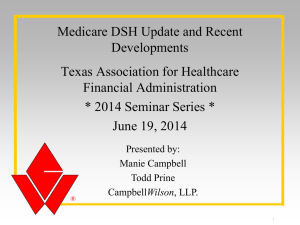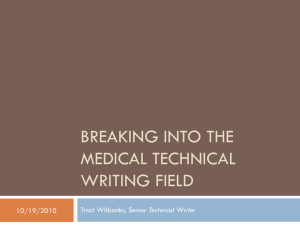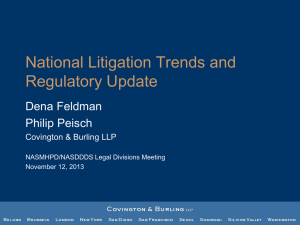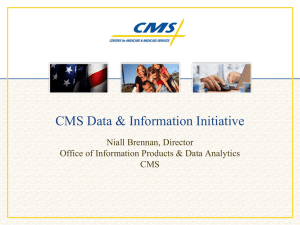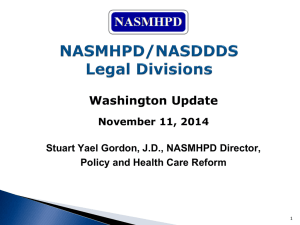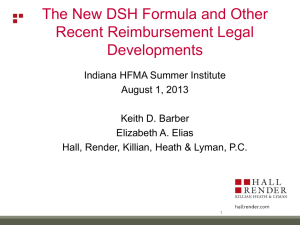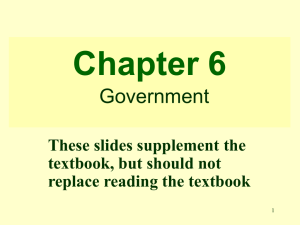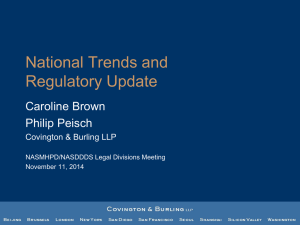Medicaid Expansion, Medicare DSH, Cost Report Procedures
advertisement
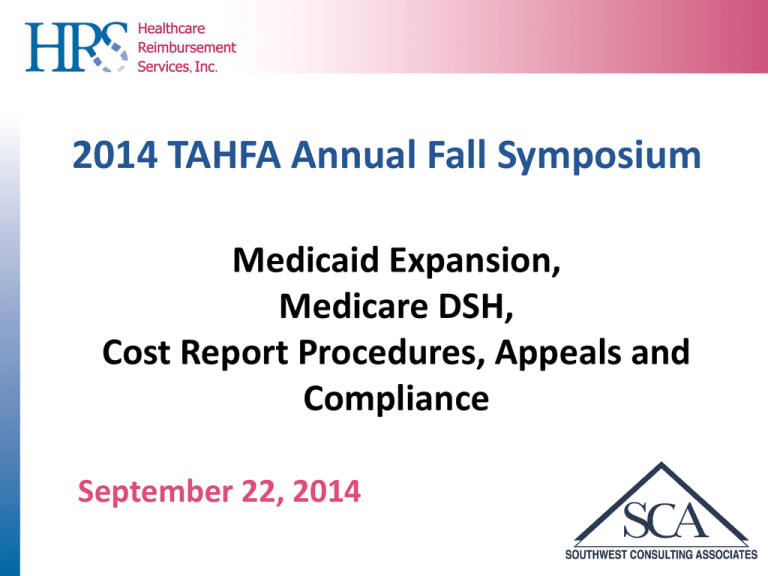
2014 TAHFA Annual Fall Symposium Medicaid Expansion, Medicare DSH, Cost Report Procedures, Appeals and Compliance September 22, 2014 OVERVIEW • Medicaid Expansion • Final Medicare DSH Rule for FFY 2015 • Issuance of Notice of Program Reimbursement (NPR) • Amending Cost Reports • Failure to Issue a Timely NPR • 2 Midnight Rule • Appeals • CMS Ruling 1498-R • Medicare Advantage/Medicare + Choice/Managed Care Part C Days (Part C Days) • Rural Floor Budget Neutrality Adjustment (Rural Floor) • Compliance 2 MEDICAID EXPANSION The Affordable Care Act authorizes states to expand Medicaid to adults under age 65 with income of up to 133 percent of the federal poverty level (approximately $15,280 for a single adult in 2013) and provides unprecedented federal funding for these states. The Federal government will pay for 100% of the cost of coverage for newly eligible individuals through 2016, and pay no less than 90% of the cost subsequently. Expanded coverage thanks to the Affordable Care Act through the Medicaid program and through Health Insurance Marketplaces is expected to significantly reduce uncompensated care borne by hospitals and other providers. At the same time as the Affordable Care Act expands coverage that reduces levels of uncompensated care, it also reforms Medicaid DSH allotments to reflect anticipated changes in coverage. Currently, states make Medicaid DSH payments to hospitals that serve a disproportionate share of low income patients and have high levels of uncompensated care costs. States have broad discretion to distribute Medicaid DSH payments to hospitals, subject to hospital-specific payment limits and state-wide DSH allotments. DSH allotments vary among states. The Affordable Care Act directs that there be better targeting of this funding towards uncompensated care. See CMS Fact Sheet, Medicaid State Disproportionate Share Hospital Allotment Reductions Final Rule (September 13, 2013) MEDICAID EXPANSION Coverage under the Affordable Care Act is to be expanded to reduce levels of uncompensated care. Medicare and Medicaid DSH allotments are to be reformed under the Affordable Care Act to reflect the changes in coverage. MEDICAID EXPANSION On December 18, 2013, Congress passed a two-year budget deal that among other things delayed Medicaid DSH cuts from this year to 2016. However, now the cuts will increase by $3.9 billion over 10 years. Hospitals pushed for this delay because the reduced rate of uninsured used to justify the cuts was not expected to occur because of the enrollment problems and the states not expanding Medicaid. See HFMA Healthcare Business News, “Congress Passes DSH Delay, Sequester Extension” (Dec. 19, 2013). MEDICARE DSH REIMBURSEMENT Total federal spending: ($ billions) FY 2000 5.18 FY 2001 5.68 FY 2002 6.63 FY 2003 7.10 FY 2004 7.82 FY 2005 9.00 FY 2006 9.18 FY 2007 9.40 FY 2008 10.12 FY 2009 10.42 FY 2010 10.83 FY 2011 11.59 FY 2012 11.93 FY 2013 12.13 • Source: CMS, Office of the Actuary FY 2014 12.56 FY 2015 13.38 MEDICARE DSH RULE FOR FFY 2015 MEDICARE DSH RULE FOR FFY 2015 Effective Federal Fiscal Year 2015 • New DSH formula • 25% based on current formula • • 25 percent of what hospital would have been be paid under existing DSH payment formula $13,383B * 25% = $3,346B 75% based on uncompensated care • New payment based in part on uncompensated care FINAL DSH RULE FOR FFY 2015 Factor 1 - 75% of amount which would have been paid under old DSH formula • CMS estimates this to be $9.579 billion DSH Payment under old rule = $13.383B x 75% = $10.038B Factor 2 - 1 minus percent change in uninsured population • CMS estimate this to be 76.19% Uninsured percentages based on CBO estimates • Uninsured in 2013 (based on 2010 report) = 18%, • Estimate for 2014 published in Jul 2013 = 17%. 1-[(.1375-.18)/.18] = 1 - .2361 = .7639 less statutory reduction .002 =.7619 $10.038B x .7619B = $7.648B • This amount is fixed prospectively • Actual amounts paid may exceed or fall short FINAL DSH RULE FOR FFY 2015 Factor 3 - Percent of individual hospital uncompensated care costs to total uncompensated care costs • • • • • • • • This represents each hospital’s “piece of the pie” CMS discusses the use of S-10 data CMS indicates S-10 data is not yet appropriate to use CMS proposes a proxy for uncompensated care is to count low income patients CMS finalizes Medicaid eligible days and SSI days as a proxy for uncompensated care Interim uncompensated care payments will be distributed on a per discharge basis Factor 3 table includes a per-claim amount (by provider) Per discharge interims payments for uncompensated care will now be in pricer ISSUANCE OF THE NPRS Issued for fiscal years 2007-2011, and even some 2012 Cost Reports Various issues that may need to be appealed or reopened: • Disproportionate Share Hospital (DSH) Calculation • • • • • SSI percentage Ratios (SSI%) – Medicare Proxy (Systemic Errors and Recalculations) Medicare Part C Days Dual Eligible Days – Exhausted/Medicare Secondary Payor (MSP)/No Pay Days 340-B qualification DSH Eligible Days – Medicaid Proxy • Bad Debts • • • • • Crossover – Medicare/Medicaid IME / GME Rural Floor Budget Neutrality Adjustment (RFBNA) Outliers 2 Midnight Rule ISSUANCE OF THE NPRS: RECOMMENDATIONS Schedule deadlines for Reopenings • Three (3) years from the date of the NPR Schedule deadlines for Appeals • 180 days from the NPR date for Appeals • Board must receive Provider’s request no later than 180 days after the Provider received the determination being appealed • Provider is presumed to have received the determination 5 days after issuance, unless established to the contrary by a preponderance of the evidence. (42 C.F.R. § 405.1801(a)(1)) • Date of receipt by the Board is date of delivery if delivered by a nationallyrecognized courier, or the date stamped “received” if delivered otherwise, unless established to the contrary by a preponderance of the evidence • Determination of date of receipt is not subject to appeal ISSUANCE OF THE NPRS: RECOMMENDATIONS Order MEDPAR Data through the Centers for Medicare and Medicaid Services (CMS) • Data Usage Agreement (DUA) process Appeal your NPRs for self- disallowed items (protest) or items adjusted during audit • Whether through an individual appeal or Group Appeal Join Group Appeals • Strength in numbers • May not have a choice Amend your Cost Report AMENDING THE COST REPORT Amend 2009 – 2012 filed cost reports (may or may not be accepted)… • Protested Items - for any self-disallowance items such as • RFBNA (through FY 2011) • SSI% • Medicare Part C • Dual Eligible Days – Exhausted Days / Medicare Secondary – No Pay Days • Additional Medicaid Eligible Days • Bad Debts – Crossovers (Medicare / Medicaid) • Outliers • Two-Midnight Rule AMENDING THE COST REPORT A provider may file or the MAC may require an amended cost report to: 1. Correct material errors detected subsequent to the filing of the original cost report. 2. Comply with the health insurance policies or regulations, or 3. Reflect the settlement of a contested liability. See HIM 15-1, § 2931.2 AMENDING THE COST REPORT What to send: • Cover letter to MAC • Relevant Worksheet (s) • New or revised list of protested items • Signed certification page • Electronic cost report (ECR) data file (resubmit) See HIM 15-1, § 2931.2 FAILURE TO ISSUE A TIMELY NPR Allina Health F/B/O Abbott Northwestern Hospital, Case No. 13-775 (RMC) • • • • • Plaintiffs challenged the PRRB’s decision that it lacked jurisdiction over an appeal filed as a result of the MAC’s failure to issue a timely NPR PRRB held pursuant to 42 C.F.R. § 405.1835(a)(1) that it lacked jurisdiction over the merits of Plaintiffs’ outlier claims because plaintiffs failed to establish in their cost reports that they were “dissatisfied” with their outlier payments. Specifically, the Board ruled that the provider failed to adhere to the regulation at 42 C.F.R. § 405.1835(a)(1) requiring the provider to express dissatisfaction by either claiming reimbursement for the specific cost in its cost report, or by “self-disallowing” the cost by listing it as a “protested amount.” Administrator did not review, Board decision was the final Agency decision and was appealed to United States District Court in the District of Columbia. The Department of Justice announced that it would not defend the Board’s decision to the extent it required a provider to either claim reimbursement for the specific cost in its cost report, or to “self-disallow” the cost on their cost report, in cases involving appeals resulting from a MAC’s failure to issue a timely NPR. In making this determination, the Secretary necessarily acknowledged that the provisions of 42 C.F.R. § 405.1835(a)(1) requiring a provider to express dissatisfaction in their cost report is inconsistent with the statute in cases involving appeals from an untimely NPR. FAILURE TO ISSUE A TIMELY NPR Charleston Area Medical Center v. Sebelius, Case No. 13-643 (RMC) • • • On August 6, 2014, the United States District Court for the District of Columbia enjoined CMS, its MACs and the PRRB from applying the self-disallowance regulation to any pending or future administrative appeal to the PRRB that involves a MAC’s failure to issue a timely NPR within twelve months of the provider’s filing of its cost report. In particular, the court issued an order “that the Board, the rest of [HHS] . . ., and all current and future Medicare contractors are enjoined from applying 42 C.F.R. § 405.1835(a)(1)’s ‘dissatisfaction’ requirement for Board jurisdiction to any pending or future Board appeal that . . . is based on the Medicare contractor’s failure to issue a timely NPR.” The court’s order is consistent with CMS’s “technical correction” in the 2015 final rule, where CMS clarifies that the dissatisfaction requirement does not apply to appeals stemming from the MAC’s failure to timely issue an NPR. CMS’s technical correction is retroactive to October 1, 2008, and CMS states that providers may seek reopening of any adverse decisions issued in the three years before October 1, 2014 that were based on prior application of the self-disallowance regulation. 2 MIDNIGHT RULE 2014 IPPS Final Rule gave an “appropriate” definition of an inpatient admission • When a patient stays in the hospital over two midnights • CMS giving three months to get acclimated before case reviews begin…Amnesty Period = Oct 1 – Dec 31, 2013 then extended to Oct 2014 • CQ (2/4, Young, Subscription Publication) reports that Medicare’s two-midnight rule has been delayed by six months. The rule clarifies inpatient versus outpatient care. Medicare Part A will consider a patient stay as inpatient if it spans two midnights. The delay gives hospitals “time to both work on in-house tools and systems needed to comply with the new regulation and to try to persuade federal officials to alter the regulation.” 2 MIDNIGHT RULE CMS Reasoning behind the Rule • Limit the use of observation status to reduce the financial burden • Must protest and item if no adjustment on cost report • How will the rule be interpreted and applied? • Proactively reduced the Inpatient Payment Rate by .2% • Actuarial analysis suggest an increase of 40,000 admissions APPEALS New PRRB Rules (Effective March 1, 2013) Harder to win and to file cost report appeals More documentation than ever before Strict interpretation of the jurisdictional rules Must protest items want to appeal on the cost report APPEALS: JURISDICTIONAL CHALLENGES The PRRB is currently questioning jurisdiction when a provider appeals an issue not adjusted or protested for all cost reporting periods ending on or after December 31, 2008 The PRRB is generally denying jurisdiction Need to amend cost reports that have not had an NPR issued Protest – It may be your only avenue to appeal an issue APPEALS: JURISDICTIONAL DECISIONS The appeal of a PRRB jurisdictional decision is not ripe until the PRRB issues a decision disposing of the case in its entirety Thus, in a multi issue case, appeal of the denial of jurisdiction over one issue only becomes ripe when the PRRB decides all the issues on their merits and thus disposes of the entire case APPEALS: SHOULD I GO TO COURT? The Best Offense is a Good Defense • In light of the time, cost and speculative outcome associated with jurisdictional challenges, a provider is well advised to attend to and if possible to resolve jurisdiction issues at the level of the PRRB • • • Request PRRB reconsideration Request CMS Administrator review Appeal to Federal court Cost/Benefit Analysis • The probability weighted cost of a jurisdictional appeal should be compared to the underlying amount of payment to be recovered if the jurisdictional appeal is successful • A successful jurisdictional appeal returns the case to the PRRB, which does not necessarily mean that a provider will prevail CMS RULING 1498-R Pursuant to CMS Ruling 1498-R, the PRRB Must Remand the Following DSH Issues: • Supplemental Security Income (SSI), • Non-covered inpatient days for patients entitled to Medicare Part A and days where the patient’s Part A benefits were Exhausted for discharges before October 1, 2004 (Exhausted Dual Eligible days) and • Labor/Delivery Room inpatient days (Labor Room days) for cost reports beginning prior to October 1, 2009. PART C DAYS Settled or Pending Appeals in Federal Court Over the Inclusion of Medicare Part C Days in Medicaid Fraction of DSH Calculation • Northeast Hospital Corporation v. Sebelius, 657 F.3d 1 (D.C. Cir. 2011) • Pre 10/1/2004 • The D.C. Circuit ruled that these days be included in the Medicaid fraction of the DSH Calculation • Allina Health Services, et al. v. Sebelius (Case No. 13-5011) • 2007 – 2008 • The United States District Court for the District of Columbia decided that the Agency failed to meet notice and comment requirements in the 2004 rulemaking when the Agency attempted to include part C days in the SSI fraction, rather than in the Medicaid fraction of the DSH Calculation • The District Court vacated that 2004 attempted rule change, and the D.C. Circuit affirmed the vacatur • Plaintiffs are seeking further relief at the District Court in the form of an injunction to enjoin the Secretary from applying the vacated rule when calculating any final, tentative, or interim DSH payments for Plaintiff Hospitals or when calculating any component of the DSH payment calculation for any hospital cost year for Plaintiff Hospitals beginning before October 1, 2013 • Baptist Medical Center, et al. v. Sebelius (Case No. 1:11-cv-01273 (CKK)) • 1995 - 1998 • Still pending in United States District Court for the District of Columbia RURAL FLOOR In 1997, Congress enacted the Balanced Budget Act (“BBA”) of 1997, § 4410(a), Pub. L. No. 105-33, requiring the wage index for hospitals located in an urban area to not be less that the wage index for hospitals located in rural areas in the same state. The BBA of 1997 provided that “the area wage index applicable . . . to any hospital which is not located in a rural area . . . may not be less than the area wage index applicable . . . to hospitals located in rural areas in the State in which the hospital is located.” RURAL FLOOR Rather than adjusting area wage indexes to achieve budget neutrality, the Secretary instead adjusted the standardized amount. The Secretary then carried forward the adjusted standardized amount from year to year. • Example: If the rural floor threatened to increase aggregate payments in a particular year, a downward adjustment to the standardized amount was applied to offset the effect of the rural floor. The Problem: The Secretary duplicated prior adjustments by each year calculating the full amount of the adjustment necessary to counteract the effect of the rural floor and then applying that adjustment to a figure that includes adjustments carried over from previous years. The Cumulative Effect: The improperly duplicative budget neutrality adjustments reduced the payment levels below what they otherwise should have been. RURAL FLOOR In Cape Cod Hosp. v. Sebelius, 630 F.3d 203 (D.C. Cir. 2011), the D.C. Circuit held that the Secretary’s application of the RFBNA for FY 2007 and 2008 was improperly computed as a result of methodological/mathematical errors on the part of the Secretary. See 76 FR 25787, 25787-26084 (May 5, 2011). Accordingly, under Cape Cod, the Secretary is obligated to correct the RFBNA to afford full and complete relief to the Provider regarding this issue. RURAL FLOOR Based on Cape Cod, Providers settled and received payment for this issue from CMS just last year. Numerous Providers have since appealed the same issue and now CMS is offering to settle with these Providers as well. Still time to appeal the issue since the delay of the issuance of the NPRs, but better hurry! COMPLIANCE: S-10 CMS, in its 2014 final rule, stated that Worksheet S-10 is the only national data source that includes uncompensated care cost data for all Medicare hospitals. CMS also detailed that it may proceed with a proposal to use S-10 to determine uncompensated care costs in the future, once hospitals are submitting accurate and consistent data through the worksheet. CMS further stated that, “hospitals attest to the accuracy and completeness of the information reported in the cost report at the time of submission”, when discussing the use of S-10 for payment purposes. CMS has not indicated when it will transition from the use of Medicaid + SSI days to S-10 data. Given the dollars at stake, and the audit/compliance risk once S-10 data is audited, now is the time for hospitals to ensure data reported on S-10 is accurate. COMPLIANCE: 340B Audit and Compliance Activity Increasing in scope • Concerns have been raised by Senator Grassley that savings under the 340B program are not being reinvested toward the mission of providing uncompensated care. • House and Senate negotiators signed off on an increase in spending from $4.4MM to $10.2MM, which includes an additional $6MM for new 340B program integrity efforts. • Hospitals that dispense 340B drugs can expect increased scrutiny through audit and enforcement activity. Published Audit Results • 51 audits have been conducted, where results have been published • 19 had no findings and 7 had findings corrected at audit • 16 had major violations including the repayment of 340B discounts to the manufacturer • 9 had major violations, but sanctions have yet to be published. • In summary, 63% of the audits resulted in some type of violation and sanctions either levied or pending. Given the increased scrutiny and enforcement activity, hospitals should be conducting internal audits and/or engaging firms to conduct these audits as a third party as part of their ongoing compliance program. WHERE DO WE GO FROM HERE? Changes in Medicaid and Medicare DSH • Reduction in reimbursement, more important than ever to preserve your appeal rights Changes in Appeals Rules • Many pitfalls, Board is ruling against Providers on jurisdiction • Must protest an item if no adjustment on cost report CMS Ruling 1498-R SSI Methodology applied to all NPRs that have issued over the last 2 years • Board is no longer remanding • Board is breaking DSH/SSI issue into multiple components Compliance • S-10 • 340B ABOUT THE SPEAKERS Corinna Goron Kristin L. DeGroat, Esq. President Healthcare Reimbursement and Compliance Counsel Healthcare Reimbursement Services Southwest Consulting Associates 17101 Preston Road, Suite 220 Dallas, TX 75248 2805 N. Dallas Parkway, Suite 620 Plano, TX 75093 Phone: (214) 210-0881 Fax: (214) 210-0889 Main: (972) 732-8100 Direct: (682) 518-1489 Fax: (972) 732-7775 Email: CGoron@hlthrs.com Email: kdegroat@southwestconsulting.net
